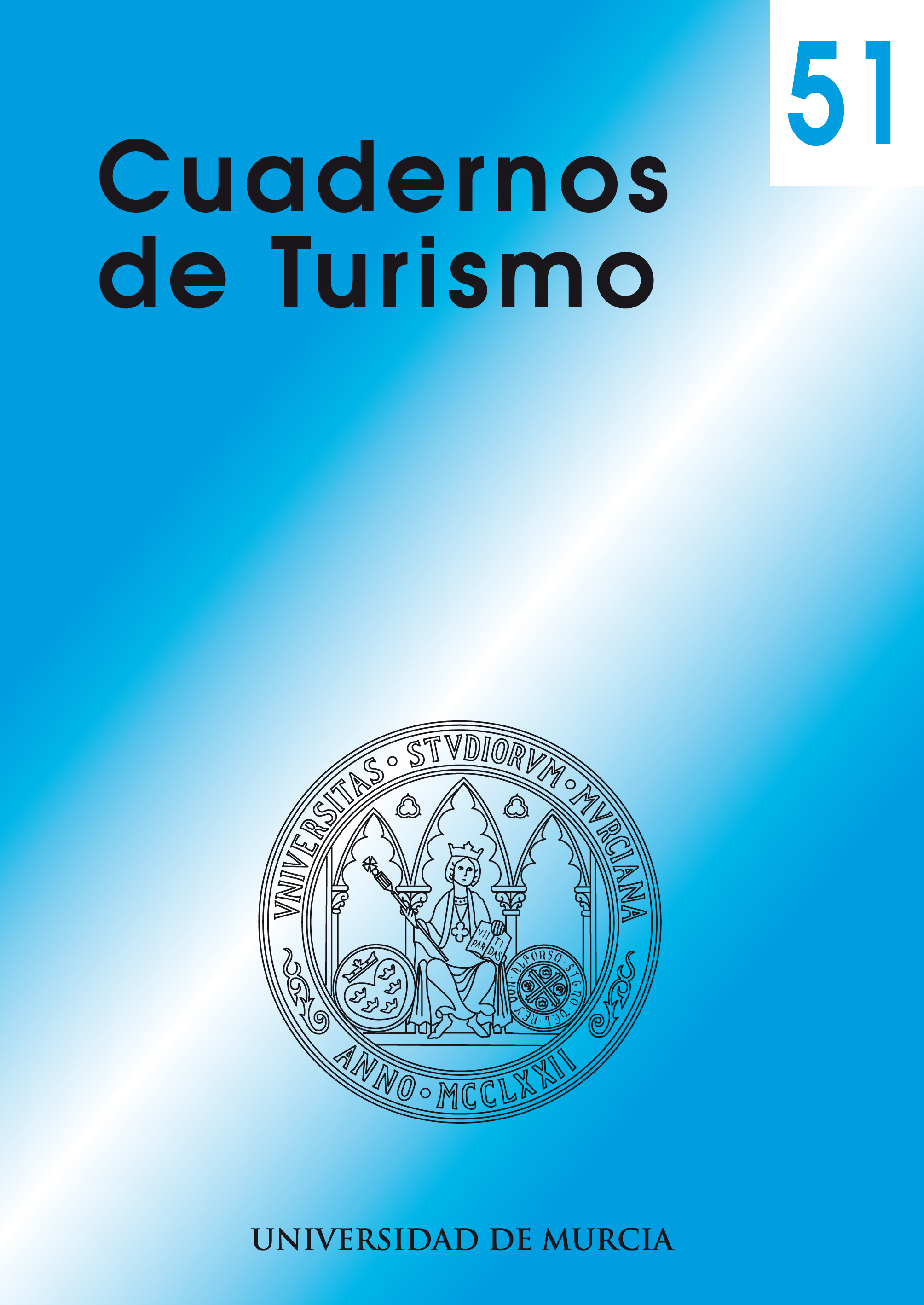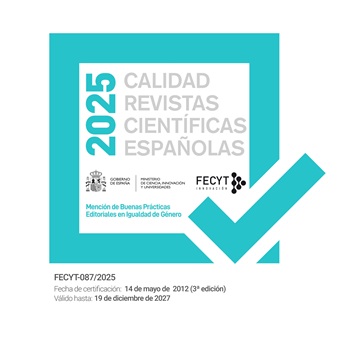CARACTERÍSTICAS POST-COVID19 DE LAS APLICACIONES DE ALQUILER DE CORTA DURACIÓN. LA FLEXIBILIDAD COMO ASPECTO CENTRAL DE AIRBNB EN BARCELONA
Resumen
El fenómeno Airbnb en Barcelona ha pasado a ocupar un papel central en el debate público local. Todo esto ha sido sustancialmente alterado por la propagación global de COVID-19. Este escenario ha promovido una reformulación del escenario del alquiler turístico, tanto de los alquileres regulares como de aquellos que también se involucraban en el escenario turístico local de manera informal y/o irregular. En este artículo, tomamos este contexto como punto de partida para analizar cómo se ha producido esta adaptación del sector del alquiler turístico en Barcelona, en relación con una interpretación flexible de la legislación sobre arrendamientos urbanos. Para ello, la metodología utilizada es básicamente cualitativa, aunque con el apoyo de una encuesta a modo de sistema de triangulación de la investigación.
Descargas
-
Resumen723
-
PDF INGLÉS 904
-
PDF ESPAÑOL904
Citas
ARANDA L. and CATÀ, J. (2020): «Los alquileres turísticos se pasan al alquiler tradicional por el coronavirus», El País. https://elpais.com/economia/2020-03- 17/los-alquileres-turisticos-se-pasan-al-alquiler-tradicional-por-el-coronavirus.html.
ARIAS-SANS, A. and QUAGLIERI-DOMÍNGUEZ, A. (2016): «Unravelling Airbnb: Urban Perspectives from Barcelona», in Reinventing the Local in Tourism: Producing, Consuming and Negotiating Place, pp. 209-228.
BARRON, K., KUNG, E. and PROSERPIO, D. (2021): «The effect of home sharing on house prices and rents: Evidence from Airbnb», Marketing Science, vol. 40 (1), pp. 23-47.
BBC (2020): «Airbnb and the coronavirus crisis: 'Tardamos 12 años en construir la empresa y perdimos casi todo en dos semanas' (It took us 12 years to build the company, and we lost almost everything in a matter of weeks)», BBC. https://www.bbc.com/mundo/noticias-53187906.
BRAJE, I. ET AL. (2022): «The changing determinants of tourists’ repurchase intention: the case of short-term rentals during the COVID-19 pandemic», International Journal of Contemporary Hospitality Management, vol. 34 (1), pp. 159-183. https://doi.org/10.1108/IJCHM-04-2021-0438
CEO (2018): «Un Fairbnb. How online rental platforms use the EU to defeat cities affordable housing measures». https://corporateeurope.org/ sites/default/files/unfairbnb.pdf.
CLANCY, M. (2020): «Tourism, financialization, and short-term rentals: the political economy of Dublin’s housing crisis», Current Issues in Tourism. https://doi.org/10.1080/13683500.2020.1786027
COCOLA-GANT, A. and GAGO, A. (2019): «Airbnb, buy-to-let investment and tourism-driven displacement: A case study in Lisbon», Environment and Planning. https://doi.org/10.1177/0308518X19869012
COCOLA-GANT, A., GAGO, A. and JOVER, J. (2020): «Tourism, gentrification and neighbourhood change: an analytical framework. Reflections from Southern European cities», in The Overtourism Debate. NIMBY, Nuisance, Commodification, pp. 121-135.
COCOLA-GANT, A., HOF, A., SMIGIEL, C. and YRIGOY, I. (2021): «Short-term rentals as a new urban frontier – evidence from European cities», Environment and Planning A: Economy and Space, vol. 53 (7) , pp. 1.601-1.608.
COLOMB, C., AGUILERA, T. and ARTIOLI, F. (2019): «Gobernanza urbana y retos de la regulación del alquiler vacacional y de las plataformas digitales en las grandes ciudades europeas (Urban governance and regulatory challenges of holiday rentals and digital platforms in major European cities)», Papers: Regió Metropolitana de Barcelona: Territori, estratègies, planejament, 1 (62), pp. 92-101.
EUROPEAN COMMISSION (2016): «Communication from the Commission to the European Parliament, the Council, the European Economic and Social Committee and the Committee of the Regions. A European Agenda for the Collaborative Economy», COM(2016) 356 final. http://ec.europa.eu/DocsRoom/ documents/16881/attachments/2/translations.
CORBETTA, P. (2003): Social Research: Theory, Methods and Techniques. London, SAGE.
COX, M. and HAAR, K. (2020): «Platform Failures: How short-term rental platforms like Airbnb fail to cooperate with cities and the need for strong regulations to protect housing», Study commissioned by members of the IMCO committee of the GUE/NGL group in the European. https://left.eu/issues/publications/platform-failures-how-short-term-rental-platforms-like-airbnb-fail-to-cooperate-with-cities-and-the-need-for-strong-regulations-to-protect-housing/ Parliament.
CRESWELL, J.W. (2003): Research design: qualitative, quantitative, and mixed method approaches. London, SAGE.
CROMMELIN, L., TROY, L., MARTIN, C. and PETTIT, C. (2018): «Is Airbnb a Sharing Economy Superstar? Evidence from Five Global Cities», Urban Policy and Research, vol. 36 (4), pp. 429-444. https://doi.org/10.1080/08111146.2018.1460722
DECREE 75/2020 OF 4 AUGUST, on Tourism in Catalonia, Diari Oficial de la Generalitat de Catalunya. https://dogc.gencat.cat/es/document-del-dogc/?documentId=879876
DELGADO, M. (2004): La ciudad mentirosa. Fraude y miseria del modelo Barcelona. Madrid, Libros de la Catarata.
DELGADO, M. (2005): Elogi del vianant. Del Model Barcelona a la Barcelona real. Barcelona, Ed. 1984.
FERNÁNDEZ PÉREZ, N. (2018): El alojamiento colaborativo. Valencia, Tirant lo Blanch.
GANDÍA, P. (2021): «Proteger a los vecinos, revitalizar la España vacía... Las propuestas de Airbnb para viajar de manera sostenible», El País.com https://elpais.com/icon-design/living/2021-06-11/proteger-a-los-vecinos-revitalizar-la-espana-vacia-las-apuestas-de-airbnb-para-viajar-de-manera-sostenible.html
GUGLIELMINETTIA, E., LOBERTOB, M. and MISTRETTA, A. (2021): «The impact of COVID-19 on the European short-term rental market», Banca d’Italia. https://www.bancaditalia.it/pubblicazioni/note-covid-19/2021/airbnb_nota_covid.pdf
GUTTENTAG, D. (2017): «Regulating Innovation in the Collaborative Economy: An Examination of Airbnb’s Early Legal Issues», in Collaborative Economy and Tourism Perspectives, Politics, Policies and Prospects, pp. 97–128.
HALL, G., SIGALA, M., RENTSCHLER, R. and BOYLE, S. (2018): «Motivations, Mobility and Work Practices; The Conceptual Realities of Digital Nomads», Information and Communication Technologies in Tourism, pp. 437-449. https://doi.org/10.1007/978-3-030-05940-8_34
HAMMERSLEY, M. and ATKINSON, P. (2007): Ethnography: principles in practice. London, New York, Routledge.
HARVEY, D. (1989a): «From managerialism to entrepreneurialism: The transformation in urban governance in late capitalism», Geografiska Annaler, Series B, Human Geography, vol.71 (1), pp. 3-17.
HARVEY, D. (1989b): La condición de la posmodernidad. Investigaciones sobre los orígenes del cambio cultural. Madrid, Akal.
HARVEY, D. (2001): Espacios del capital. Hacia una geografía crítica. Madrid, Akal.
HARVEY, D. (2012): Ciudades rebeldes. Del derecho a la ciudad a la revolución urbana. Madrid, Akal.
JAREÑO, F. (2020): «La suspensión del Mobile World Congress de Barcelona por el coronavirus saldrá muy cara», The Conversation https://theconversation.com/la-suspension-del-mobile-world-congress-de-barcelona-por-el-coronavirus-saldra-muy-cara-131731.
KADI, J., PLANK, K. and SEIDL, R. (2019): «Airbnb as a tool for inclusive tourism?», Tourism Geographies. https://doi.org/10.1080/14616688.2019.1654541
LLANESA, C. and RAYA, J.M. (2021): «The effect of COVID-19 on the peer-to-peer rental market», Tourist economics. https://doi.org/10.1177%2F13548166211044229.
MANSILLA, J.A. (2016): «Urbanismo, privatización y marketing urbano. La Barcelona neoliberal a través de tres ejemplos», Encrucijadas. Revista crítica de ciencias sociales, nº 11. https://recyt.fecyt.es/index.php/encrucijadas/article/view/79020
MANSILLA, J.A. and MILANO, C. (2018): «Becoming centre: tourism placemaking and space production in two neighbourhoods in Barcelona», Tourism Geographies. https://doi.org/10.1080/14616688.2019.1571097
MARRERO, I. (2003): «¿Del Manchester catalán al Soho Barcelonés? La renovación del barrio del Poble Nou en Barcelona y la cuestión de la vivienda», Scripta Nova. Revista electrónica de geografía y ciencias sociales, vol. VII, nº 146 (137). http://www.ub.es/geocrit/sn/sn-146(137).htm
MÜLLER, A. (2016): «The digital nomad: Buzzword or research category?», Transnational Social Review, vol. 6 (3), pp. 344-348. https//doi.org/10.1080/21931674.2016.1229930.
NIEUWLAND, S. and VAN MELIK, R. (2020): «Regulating Airbnb: how cities deal with perceived negative externalities of short-term rentals», Current Issues in Tourism, vol. 23 (7), pp. 811-825.
OBSERVATORI DEL TURISME A BARCELONA (2020): Informe de la actividad turística 2019. https://www.observatoriturisme.barcelona/sites/default/files/IAT19.pdf.
PERRY-KESSARIS, A. (2013): Sociolegal Approaches to International Economic Law: Text, context, subtext. London, Routledge.
QUAGLIERI-DOMÍNGUEZ, A. and SÁNCHEZ-BERGARA, S. (2019): «Alojamiento turístico y economía colaborativa: una revisión crítica de los discursos y las respuestas normativas», in Turistificación global. Perspectivas críticas en turismo., pp. 343-366.
REICHENBERGER, I. (2017): «Digital nomads – a quest for holistic freedom in work and leisure», Annals of Leisure Research, 21(3), pp. 364-380.
SHEN, L. and WILKOFF, S. (2022): «Cleanliness is next to income: The impact of COVID‐19 on short-term rentals», Journal Regional Science, vol. 62 (3) pp. 799-829. https://doi.org/10.1111/jors.12581
SMITH, N. (1996): The new urban frontier. Gentrification and the revanchist city. New York, Routledge.
SRNICEK, N. (2018): Capitalismo de plataformas. Buenos Aires, Caja Negra.
TELLO, R. (1993): «Barcelona postolímpica. De ciudad industrial a escenario de consumo», Estudios Geográficos, vol. 54, nº 212, pp. 507-520.
WALLERSTEIN, I. (2005): Análisis de sistemas-mundo. Una introducción. México DF, Siglo XXI Editores.
WACHSMUTH, D. and WEISLER, A. (2018): «Airbnb and the rent gap: Gentrification through the sharing economy», Environment and Planning A: Economy and Space, vol. vol. 50 (6), pp. 1.147-1.170. https://doi.org/10.1177/0308518X18778038
UZUNCA, B. and BORLENGHI, A. (2019): «Regulation strictness and supply in the platform economy: the case of Airbnb and Couchsurfing», Industry and Innovation, vol. 26 (8), pp. 920-942.
YEON, J., KIM, S.H, SONG, K. and KIM, J. (2020): «Examining the impact of short-term rental regulation on peer-to-peer accommodation performance: a difference-in-differences approach», Current Issues in Tourism. https://doi.org/10.1080/13683500.2020.1814704.
YRIGOY, I. (2019): «Rent gap reloaded: Airbnb and the shift from residential to touristic rental housing in the Palma Old Quarter in Mallorca, Spain», Urban Studies, vol. 56 (13), pp. 2.709-2726. https://doi.org/10.1177/0042098018803261
Las obras que se publican en esta revista están sujetas a los siguientes términos:
1. El Servicio de Publicaciones de la Universidad de Murcia (la editorial) conserva los derechos patrimoniales (copyright) de las obras publicadas, y favorece y permite la reutilización de las mismas bajo la licencia de uso indicada en el punto 2.
2. Las obras se publican en la edición electrónica de la revista bajo una licencia Creative Commons Reconocimiento-NoComercial-SinObraDerivada 3.0 España (texto legal). Se pueden copiar, usar, difundir, transmitir y exponer públicamente, siempre que: i) se cite la autoría y la fuente original de su publicación (revista, editorial y URL de la obra); ii) no se usen para fines comerciales; iii) se mencione la existencia y especificaciones de esta licencia de uso.
3. Condiciones de auto-archivo. Se permite y se anima a los autores a difundir electrónicamente las versiones pre-print (versión antes de ser evaluada) y/o post-print (versión evaluada y aceptada para su publicación) de sus obras antes de su publicación, ya que favorece su circulación y difusión más temprana y con ello un posible aumento en su citación y alcance entre la comunidad académica. Color RoMEO: verde.





_.jpg)









